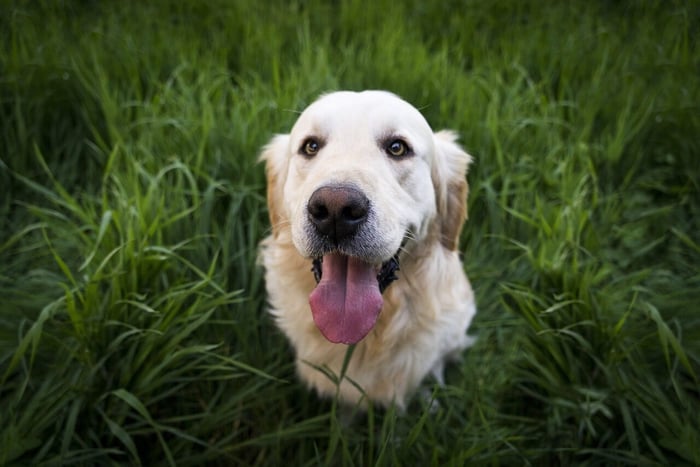Golden Retrievers are one of the most beloved dog breeds worldwide, celebrated for their gentle nature, loyalty, and intelligence. As one of the popular dog breeds recognized by the American Kennel Club (AKC), they are known not only for their good looks but also for their adaptable, friendly personalities that make them ideal family pets and trusted service dogs.
Physical Characteristics of the Golden Retriever
The Golden Retriever breed is loved across the United States not only for their affectionate nature but also for their distinctive appearance and physical traits. These medium-sized family dogs boast a beautiful thick, long coat that comes in stunning shades of gold or brown. While full-sized Golden Retrievers typically weigh between 55 to 75 pounds, miniature Golden Retrievers (also known as mini goldens) offer similar charm in a smaller package, ideal for those who prefer smaller pets in their home environment.
One notable trait of Golden Retrievers is their broad head, accompanied by friendly, expressive eyes that reflect their gentle temperament. They have short ears that hang close to the head, helping reduce the risk of common ear infections. Their flat coats are water-repellent and dense, perfect for swimming or outdoor activities like hunting and field trials. However, it's important to remember that Golden Retrievers shed year-round. Regular grooming is recommended to manage shedding and keep their coats healthy.
Healthy dogs are happy dogs, and responsible breeders registered with the American Kennel Club and local Golden Retriever clubs emphasize genetic testing and health testing. These tests often screen for hip dysplasia and eye conditions, which have a high prevalence in the breed. Organizations like the Orthopedic Foundation for Animals provide guidance to breeders and prospective puppy parents to ensure pups are in better health.
From puppyhood through their full adult life expectancy (typically 10 to 12 years), Golden Retrievers remain well-behaved and easy to train. Basic training, including potty training and obedience exercises, starts best when they're a new puppy. This foundational training ensures your Golden Retriever puppy grows into a well-mannered family member, blending easily with other dogs and animals at home.
Whether you're choosing a male or female Golden Retriever, these dogs quickly become your family's best friend, providing love, loyalty, and companionship. Their friendly disposition and ease of training make them a perfect addition to families, first-time dog owners, and even enthusiasts of dog shows across the country.

Personality and Temperament: Why Golden Retrievers Are So Beloved
Golden Retrievers consistently rank among America's favorite family dogs due to their incredibly affectionate nature and gentle temperament. Known for being exceptionally friendly and well behaved, Goldens quickly become the best friend of anyone they meet, including other dogs, pets, and especially children.
Their easy-to-train demeanor makes them ideal candidates for basic training, potty training, and even advanced obedience training, earning them a beloved spot in both households and dog shows. They thrive in a nurturing home environment where they can receive ample love, attention, and exercise. Their natural desire to please makes them remarkably responsive to training and commands.
Golden Retrievers are highly social animals who dislike being alone for extended periods. Their playful and affectionate nature requires regular social interaction, making them ideal companions for active families or those involved in outdoor activities. Whether swimming, playing fetch, or joining their families on hikes, Golden Retrievers embrace each activity enthusiastically.
Their intelligent and gentle demeanor also makes them excellent therapy and assistance dogs, frequently working alongside organizations and clubs to assist those in need. From a new puppy to mature adult, Golden Retrievers remain loyal, devoted, and loving companions who brighten every home they enter.
Training and Exercise Needs for Active Dogs
Golden Retrievers are high-energy dogs that benefit from both mental and physical stimulation. As members of the retriever family, they love having a job to do—whether it’s retrieving toys, practicing field trials, or simply learning new commands. Daily exercise is crucial to help keep them at a healthy weight and maintain better health, especially given their risk of hip dysplasia and other genetic conditions.
When it comes to training, consistency is key. Start with basic training and gradually move on to more advanced techniques like agility or scent work. Golden Retrievers respond best to positive reinforcement; praising them often for good behavior fosters their willingness to learn. Socializing your Golden early ensures they remain well behaved around other dogs, pets, and family members.
Due to their friendly and affectionate nature, Golden Retrievers make the perfect addition to active households or families who enjoy outdoor adventures. They excel at swimming, hiking, and running, making them a best friend who’s always ready for the next activity. By providing plenty of exercise outlets—such as walks, interactive games, or play sessions with other golden retrievers—you’ll help minimize potential behavioral issues and keep your dog engaged.
If you’re adopting a new puppy or considering a mini Golden Retriever, remember that each dog requires gradually increasing levels of physical activity. Consult with your veterinarian or breeder for specific exercise recommendations based on your pup’s age, weight, and overall health. Regular check-ups, health testing, and a balanced diet of quality dog food all contribute to strong, healthy dogs capable of thriving in an active environment.

Health and Potential Issues
Golden retrievers, like all dog breeds, are susceptible to specific health issues. While most Golden Retrievers will live healthy, vibrant lives, being aware of these potential health concerns can help in early detection and treatment.
Hip and Elbow Dysplasia: These are common conditions in many larger breeds, including Golden Retrievers. Dysplasia refers to a condition that affects the development of joints leading to deformities that cause pain, discomfort, and challenges, in movement. Maintaining an exercise routine and following a well-balanced diet can contribute to preventing or managing such conditions effectively.
Eye Conditions: Cataracts, Progressive Retinal Atrophy (PRA), and glaucoma are all conditions that can affect Golden Retrievers' eyes. Regular check-ups can help detect these conditions early and mitigate their impact.
Heart Conditions: Certain heart diseases, like subvalvular aortic stenosis (SAS), can occur in this breed. Regular veterinary check-ups that include heart evaluations are crucial in detecting any cardiac issues early.
Cancer: Unfortunately, Golden Retrievers have a relatively high rate of cancer compared to other dog breeds. This is a scary thought, but remember that not all cancers are fatal and there are other ways to treat them.
Skin Conditions: Golden Retrievers may suffer from various skin problems, including allergies and hot spots. Taking care of your skin and including foods that're high, in omega 3 and omega 6 fatty acids can promote healthy skin and lower the risk of developing these conditions.
Obesity: Golden Retrievers really enjoy their meals. Sometimes they can be at risk of gaining weight. Gaining weight can cause various health issues, such as diabetes and problems, with their joints. It's important to keep an eye on their diet and make sure they get exercise to maintain a healthy weight.
Although the list might seem daunting it's crucial to keep in mind that by taking care of your Golden Retriever, scheduling regular visits to the vet providing a balanced diet and ensuring plenty of exercise you significantly increase their chances of enjoying a lengthy, healthy and joyful life. Remember, maintaining health goes beyond simply preventing sickness; it's also, about nurturing their physical and mental well being.
Conclusion
Golden Retrievers are known for their friendly disposition, intelligence, and striking appearance. Their needs for exercise, proper nutrition, and healthcare are specific but manageable with awareness and attention. Whether adopting or buying from a reputable breeder, preparing your home, and creating a loving environment is essential. The experience of having a Golden Retriever by your side is truly wonderful as it brings joy, companionship and creates lasting memories. This makes them a perfect choice for both families and individuals. Whether you have experience with Golden Retrievers or are new, to the breed the love and loyalty they offer will undoubtedly enrich your life in incredible ways!












